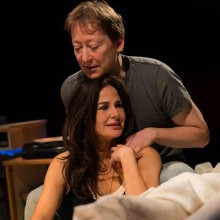Hidden in the Sand
Sally Dexter stars in James Phillips’ impressive new play at Trafalgar Studios 2

James Phillips is a playwright to watch, bubbling under with a couple of awards for his first effort, The Rubenstein Kiss, at Hampstead, and plans next year for a new piece about the designer Alexander McQueen.
Hidden in the Sand, with Sally Dexter giving a superb, tempestuous performance as a Greek Cypriot tragedy queen, comes out of a photographic commission in Cyprus, where Phillips experienced at first hand the ravages wrought by the 1974 partition, the sense of a layered history in a classical landscape, and conflicted families.
Dexter’s Alexandra, a jeweller who loves Neil Diamond (sic), is visited, I think in Nicosia (the location switches in the action need sorting out) by Scott Handy’s English classical scholar, an old flame, whose wife has left him. They renew a passionate relationship.
Alexandra’s husband, we learn, is one of the 619 Greeks still missing since the Turkish invasion, but the truth emerges as more complicated after the interventions first of Alexandra’s niece, Sophia (energetic, impulsive Daphne Alexander), a war photographer on assignment to the New York Times and Time magazine; and her estranged sister, Eleni (the elegantly restrained Yolanda Vazquez).
“Every Greek Cypriot in this country has a suitcase packed,” says Alexandra, reminding us of the feelings of injustice and hurt that still colours their displacement. Phillips’ own production, designed on a white-washed adaptable setting by Timothy Bird – with photography of the bay at Salamis and the ghost town of Famagusta – conjures a modern emotional tragedy in the form of a conversation piece.
The play is by turns moving and informative, by turns clunky and slightly arch, but it makes for a strong evening of theatre, and the acting is impassioned, Handy in particular simmering with love and later rage in a fine display of not-so-light comedy playing (culminating in Lorenzo’s heart-stopping “On such a night as this” speech from The Merchant of Venice).
The archaeological metaphor works well, too, with Sophia digging into her own family history; Alexandra’s dilemma, and the play in general, usefully reminds us of an unsolved problem while flashpoints from Kosovo to Kabul (where Sophia is off to next) grab all the headlines and international indignation.












